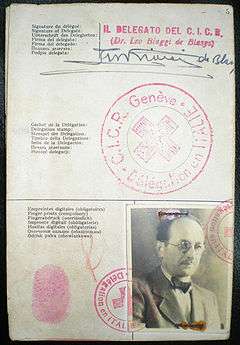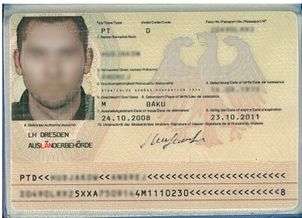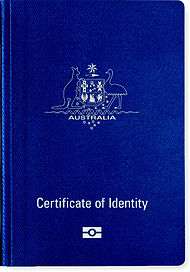Certificate of identity
A certificate of identity, sometimes called an alien's passport, is a travel document issued by a country to non-citizens (also called aliens) residing within their borders who are stateless persons or otherwise unable to obtain a passport from their state of nationality (generally refugees). Some states also issue certificates of identity to their own citizens as a form of emergency passport or otherwise in lieu of a passport. The visa requirements of certificates of identity may be different from those of regular passports.

Types
1951 Convention documents (for refugees)
A certificate of identity issued to a refugee is also referred to as a 1951 Convention travel document (also known as a refugee travel document or a Geneva passport), in reference to the 1951 Convention Relating to the Status of Refugees. 145 countries are parties to the 1951 Convention and 146 countries are parties to the 1967 Protocol Relating to the Status of Refugees. Notably, the United States is not a party to the Convention, but provides travel documents to its lawful permanent residents, either as a Re-entry Permit or a refugee travel document under the 1967 Protocol.
1954 Convention documents (for stateless persons)
A certificate of identity issued to a stateless person is also referred to as a 1954 Convention travel document, in reference to the 1954 Convention Relating to the Status of Stateless Persons.[1] 89 countries are parties to the 1954 Convention.
Unlike a refugee travel document, a certificate of identity issued by most countries does not in itself entitle the holder to readmission into the country.
Non-Convention travel documents
Non-Convention (or non-National) travel documents are travel documents issued by a country to non-citizen (also called alien) residents who do not have access to passport facilities from their own countries, are not recognized as either Convention refugees, and are not officially stateless under the 1954 Convention relating to the status of stateless persons (or the country they live in has not signed that convention).
In these cases there is no formal international agreement to regulate the issue of travel documents to these people although most countries will issue their own version of a non-convention travel document to residents. These documents broadly meet ICAO standards for international identity documents. They are known variously as Alien's Passports in mainland Europe and Scandinavia and as a certificate of identity in the United Kingdom, Australia and Hong Kong.
National examples
Certificates of identity are issued under various names, including:
- Australia - Australian Certificate of Identity
- Brunei - Bruneian International Certificate of Identity
- Canada - Canadian Certificate of Identity
- Estonia - Estonian alien's passport
- Hong Kong - Hong Kong Document of Identity for Visa Purposes
- before handover - Hong Kong Certificate of Identity
- India - Indian Identity Certificate
- Indonesia - Paspor Orang Asing
- Japan - Japan Re-entry Permit
- Latvia - Non-citizens (Latvia)
- Macau - Macau Special Administrative Region Travel Permit
- before handover - Passaporte para Estrangeiros ('Passport for foreigners')
- Malaysia - Malaysian Certificate of Identity
- New Zealand - New Zealand Certificate of Identity
- Singapore - Singapore Certificate of Identity
- United Kingdom - British Certificate of Travel
- United States - U.S. Re-entry Permit
See also
- Refugee identity certificate
- Refugee travel document
- 1954 Convention travel document
- 1954 Convention Relating to the Status of Stateless Persons
- 1961 Convention on the Reduction of Statelessness
- Nansen passport
- Travel document
References
- Blitz, Brad K.; Lynch, Maureen, eds. (June 2009). Statelessness and the Benefits of Citizenship: A Comparative Study. Geneva Academy of International Humanitarian Law and Human Rights and International Observatory on Statelessness. p. 27. ISBN 978-0-9563275-1-2.
External links
- Travel documents Passport Canada
- Certificate of identity Fijian embassy to the United States
- Certificates of identity Legalization of Identity Certificate
- Certificate of identity Malaysia
- Refugee travel documents and certificates of identity New Zealand Dept. of Internal Affairs
- Certificates of identity Singapore Immigration & Checkpoints Authority
- Certificate of travel United Kingdom Home Office

